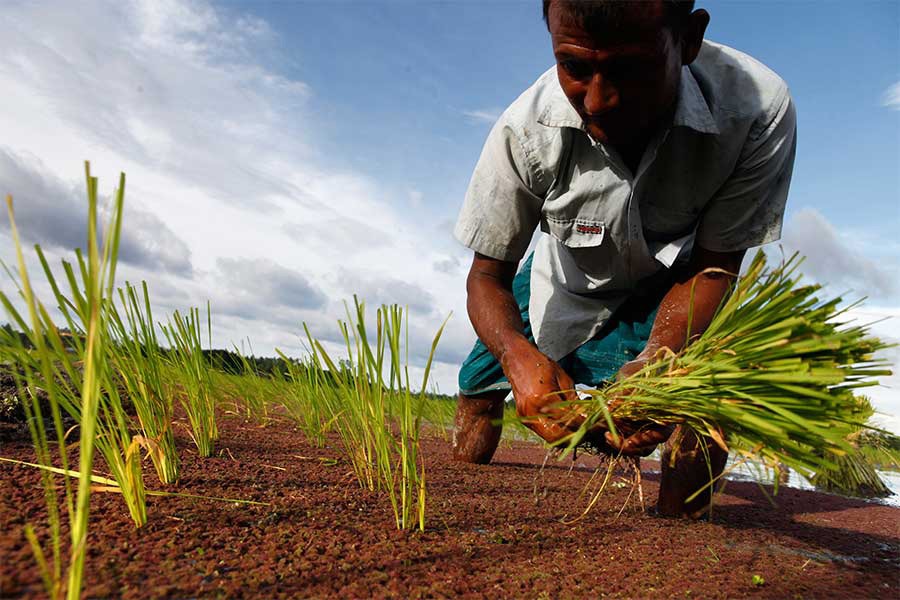A substantial increase in the prices of different agri-inputs has pushed up the cost of Boro plantation across the country this year, according to agriculturists and farmers.
They also fear it may hike rice prices further in the markets.
Under such unexpected circumstances, experts have called upon the authorities concerned to remain alert and keep close watch on the market. They have also called for ensuring fair prices of agricultural produce.
Boro is a major contributor to rice production in the country. It accounts for 55 per cent of the total rice output in the country.
Costs of inputs including seed, irrigation, fertiliser, and pesticides surged by 25-30 per cent this Boro season, according to farmers in Rangpur, Rajshahi, Kushtia, Barisal, Bogra and Comilla.
"I bought Brridhan-28 seed at Tk 100 a kilogram from private seller as its stock ran out at Bangladesh Agricultural Development Corporation (BADC). It was sold at Tk 38-Tk 60 a kg at my village," said Motiur Rahman, a farmer of Charaikhola union in Nilphamari.
"We need 1.5 kg of quality seed to prepare the seedbed for per bigha (33 decimals) of land," he said, adding that high prices of Aman paddy have put impact on the input market too.
Traders are charging much higher than that of normal prices for plough, irrigation, seed, pesticides due to high paddy prices, he said.
"Irrigation cost increased to Tk 1,250 per bigha from Tk 1,000 last year," he said.
"Overall output cost per bigha is likely to go up by minimum 25 per cent (excluding transport costs) in the country's northern region this year," he added.
Md Abdul Salam, a farmer who lives in East Ziarukhi union in Sadar upazila of Kushtia, told the FE that a volume of fertiliser will have to be increased due to 'bad clay' enters the fields during flooding last year.
He said they needed to use 24-25 kgs of urea, 10 kgs of TSP, 8 kgs of MOP per bigha which have surged to 30, 12 and 10 kgs respectively this year.
Local sellers were also charging additional Tk 2-Tk 5 per kg for fertiliser against government-fixed prices, he said, adding that fertiliser cost is set to increase by Tk 250 per bigha at their village this year.
Pesticide cost also rose by Tk 200 per bigha while labour cost by Tk 600-Tk 750, he said.
Our correspondents from Rajshahi, Barisal, Bogra and Comilla reported that costs of Boro farming are set to rise by 25-30 per cent in the districts this year.
Department of Agriculture Extension (DAE), which formally informs the government on production costs, was preparing a report.
Alhaj Uddin Ahmed, deputy director at monitoring unit under the field service wing of DAE, told the FE that primary reports showed that Boro output cost might increase by 8-10 per cent.
Last year the DAE estimated the production cost of Boro rice at Tk 32 per kg while the government fixed its procurement rate at Tk 34 per kg.
Mr Ahmed said the government has stressed the need for boosting Boro production as its output hit an eight-year low--- 18.01 million tonnes last year following a flashflood in haor areas.
The government set target to bring 4.725 million hectares of land under Boro cultivation and to produce 19.04 million tonnes of rice, he said.
He said 52 per cent of the target was achieved till February 10 and plantation will be going on until mid-March.
Centre for Policy Dialogue (CPD) research fellow Towfiqul Islam Khan said a hike in Boro production cost could make rice pricier.
He said rice prices started increasing even this Aman harvesting season.
The government's stock should be maximised to 1.5 million tonnes from current 0.45 million tonnes to support limited income group, he said.
He said the import policy should be time-befitting to keep the market stable for the sake of the country's more than 40 million poor people.
Agricultural Economists Association (AEA) vice president Golam Hafiz Kennedy told the FE that the government should ensure minimum price support for farmers like that of Aman season.
Apart from indirect fertiliser subsidy, farmers should be encouraged with cash incentives in the flood-affected districts which could minimise production costs to some extent.
At a time, authentic data on mill-gate cost, import prices and local production should be published regularly to avoid any manipulation in the market like that of last September-October period.
Rice prices, however, increased by Tk 1-Tk 2 per kg in last four days in the market as coarse rice was sold at Tk 46-Tk 50, medium quality Brridhan-28 at Tk 55-Tk 60 and finer variety Miniket, Jeerashail and Najirshail at Tk 62-Tk 75 a kg.
According to the Trading Corporation of Bangladesh (TCB), rice prices hit all-time high in September last.
Rice prices are still 22-31 per cent higher compared to a year ago, TCB said.


